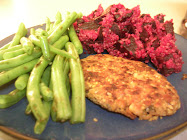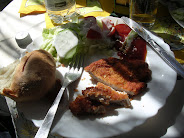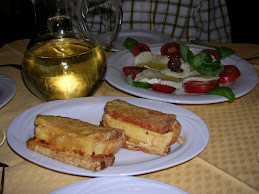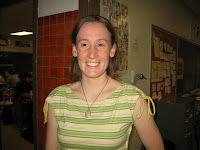Recently, I had a great conversation about food with my good friend Aaron. Both of us have experimented with different diets that advocate for supplements, specifically high protein supplements. Personally, the diet worked well for me; I lost some weight and felt pretty great about what I was doing for myself. Aaron was also a fan of the diet. Since then I have read books by Marion Nestle and Michael Pollan, both of whom advocate for whole foods and are critical of food science. Even though I enjoyed the nutrition program that I experimented with, I now find myself much more critical of anything that tells me I need to supplement my diet with "edible food-like substances." I agree with the idea that whole foods can provide me with everything I need, and I also find it to be a very romantic perspective to have.
As I was expressing this view to my friend, a very intelligent, scientifically minded man, and he accused me of being critical of innovations just because they are new and different. Food science had already brought about helpful things such as preservatives and different supplements for people with debilitating allergies. Why judge a protein bar that conveniently provides important vitamins and minerals just because it comes from a lab instead of off a tree? Well... good point. Where is the line between arguing that we should still be running around naked, eating berries and wild animals because that's how we used to do it and arguing that certain things just don't need to be improved upon? I'm not sure I have an answer to that totally, but I have a few more arguments after reading the first part of In Defense of Food: An Eater's Manifesto.
As Michael Pollan points out in his discussion of the FDA's decision in 1973 to allow modified foods to be marketed without the "imitation" label that was previously required, Nutritional science and food science is assumed to have a thorough understanding of how foods nourish our bodies. This, however, is not always the case.
1) Margarine. Margarine was introduced in the last century as a way to avoid saturated fats. Food scientists used hydrogenated vegetable oils to make a substance that was similar to butter. Americans ate this for decades before we all realized that the trans-fats created by hydrogenating vegetable oils were twice as bad for us as the naturally occurring saturated fats in butter were. Ooops... We clearly hadn't figured it out at this point.
2) Snackwells and the Fat Phobia. More recently, in another attempt to avoid fats, Americans became obsessed with low fat alternatives. The vast majority of foods engineered to be lower in fats are much higher in refined carbohydrates; for example, Snackwell products. The reduction in food fats accompanied with the increases in refined sugars has increased the obesity problem in the United States instead of decreasing it. Ooops again!
3) Baby Formula. I haven't read much about this specifically, but Pollan refers to it multiple times. Apparently the trial and error food scientists have gone through in creating infant formulas that adequately replicate breast milk is a great example of how much we still don't know about the intricate nature of food and health.
These might partially justify my "techno-phobia" and I will keep you updated as to whether my friend finds these reasons valid. Ultimately, the best reason I have to eat real food and avoid "food-like substances" is that human science is flawed and will continue to be so for a long time. Nature, on the other hand, produces some pretty delicious dishes if I do say so myself... and I'm pretty sure they won't make my pee smell like chemicals. That's a good thing in my book.
Saturday, February 9, 2008
Subscribe to:
Post Comments (Atom)







No comments:
Post a Comment